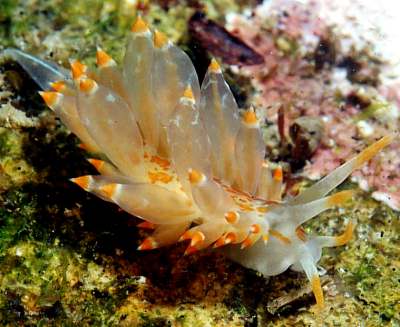
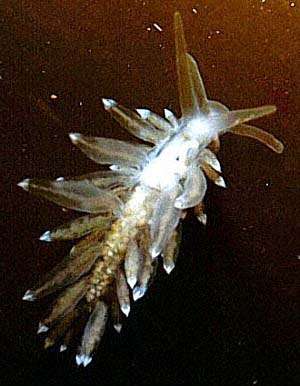
Eubranchus farrani
(Alder & Hancock, 1844)
Order: NUDIBRANCHIA
Suborder: AEOLIDINA
Family: Eubranchidae
DISTRIBUTION
Northeastern Atlantic from Norway to western Mediterranean.
PHOTO
Upper: Sete, étang de Thau, Mediterrnaena coast of France, March 2000, depth: 5m, size: 1cm. Photo: J-P. Bielecki.
Lower: approx. 10mm long, crawling on a kelp frond at 7 metres in NW Scotland. PHOTO: Jim Anderson. See Scottish Nudibranchs website.
This species has in the past been confused with Eubranchus tricolor but E. farrani is quite distinct, being more slender, smaller with fewer cerata of less compressed shape and different colour patterns.
The maximum length of the animal is 20 mm (23 mm in the Bay of Naples, according to Schmekel & Portmann, 1982). The body is typically white or grey-white, with orange-tipped rhinophores and oral tentacles (sometimes with white apices), with scattered orange spots and blotches on the dorsum, and white inflated cerata having a conspicuous sub-terminal orange or yellow ring. Occasional variants show individual exaggeration of certain markings. The entire body, cerata and all, may be of a beautiful golden hue. In others there may be brown patches on the body, and in one specimen (from Pembrokeshire) nearly the whole body was dark chocolate brown in colour (approaching the Form B of Edmunds & Kress). Other specimens may have orange blotches ringed with blue (Garstang, 1980; Farran, 1903), and the juveniles may exhibit no colour at all other than the pale brown or salmon pink hepatic contents of the cerata.
The cerata are arranged in up to 10 diagonal rows, of up to 5 cerata in each half-row. Their shape may be variable from minute to minute but it can always be seen that they are moderately inflated.
See Bernard Picton's message below, and his website for further information.
Reference:
• Edmunds, M. & Kress, A. (1969) On the European species of Eubranchus (Mollusca Opisthobranchia). Journal of the Marine Biological Association of the United Kingdom, 49: 879-912.
• Thompson, T.E. & Brown, G.H. (1984) Biology of Opisthobranch Molluscs, Vol 2. Ray Society: London.
Rudman, W.B., 2003 (October 14) Eubranchus farrani (Alder & Hancock, 1844). [In] Sea Slug Forum. Australian Museum, Sydney. Available from http://www.seaslugforum.net/find/eubrfarr
Related messages
White form of Eubranchus farrani from the Baltic Sea
January 13, 2010
From: Thorsten Walter
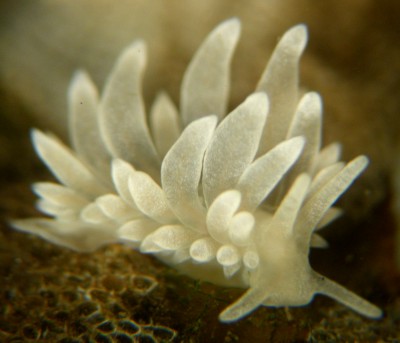
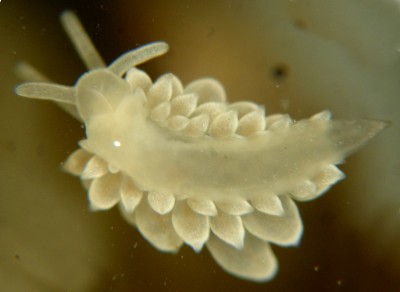
Dear Bill Rudman,
I am the owner of a small local aquarium/museum located at the Baltic Sea in Lübeck-Travemünde, northern Germany. During our field trips with school clases we sometimes found small nudibranchs, inside the harbour in front of our station. The salinity of the water is normally 1.0-1.5 psu.
Locality: Harbour, less than 1 metre, Germany, Schleswig-Holstein, Baltic Sea, 19 December 2009, On Laminaria covered mainly with Ciona intestinalis. Length: 6 mm. Photographer: T. Walter.
I think this is a species of Eubranchus.
It would be great if you or somebody else can help me with the species identification.
Best regards
Thorsten Walter
info@ostseestation.de
Walter,T., 2010 (Jan 13) White form of Eubranchus farrani from the Baltic Sea. [Message in] Sea Slug Forum. Australian Museum, Sydney. Available from http://www.seaslugforum.net/find/23079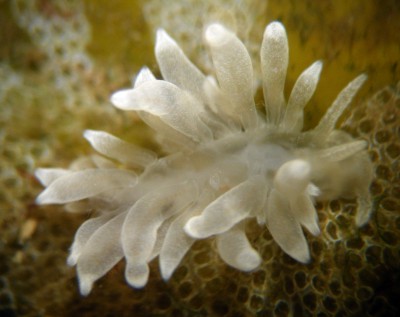
Dear Thorsten,
I am not a great expert on the North Atlantic fauna but I am pretty sure this is another colour form of Eubranchus farrani. It is not as colourful as your orange-spotted animal [message #23077] but IT could possibly develop some colour as it grows.
Best wishes,
Bill Rudman
Eubranchus farrani from the Baltic Sea
January 12, 2010
From: Thorsten Walter
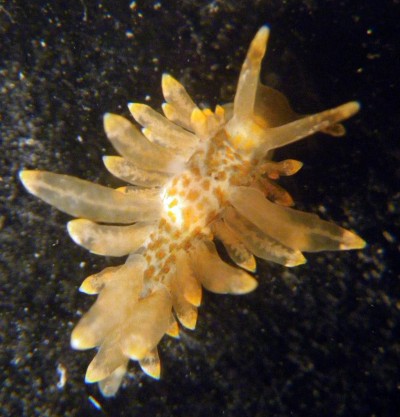
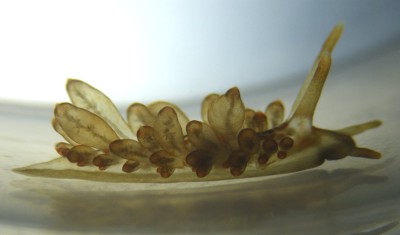
Dear Bill,
I am the owner of a small local aquarium/museum located at the Baltic Sea in Lübeck-Travemünde, northern Germany. During our field trips with school clases we sometimes found small nudibranchs, inside the harbour in front of our station. The salinity of the water is normally 1.0-1.5 psu.
I tentatively identified one species as Eubranchus exiguus,the second as Tenellia adspersa. For the others I have no idea. In this message I have included pictures of E. cf. exiguus. Images of the other species will follow with the next email.
Locality: Harbour, less than 1 metre, Germany, Schleswig-Holstein, Baltic Sea, Luebeck Bight, Passathafen, 14 December 2008, On Mytilus edulis covered mainly with Laomedea flexuosa and Aurelia aurita polyps. Length: 5 mm. Photographer: T. Walter.
It would be great if you or somebody else can help me with the species identification.
Best regards
Thorsten Walter
info@ostseestation.de
Walter, T., 2010 (Jan 12) Eubranchus farrani from the Baltic Sea. [Message in] Sea Slug Forum. Australian Museum, Sydney. Available from http://www.seaslugforum.net/find/23077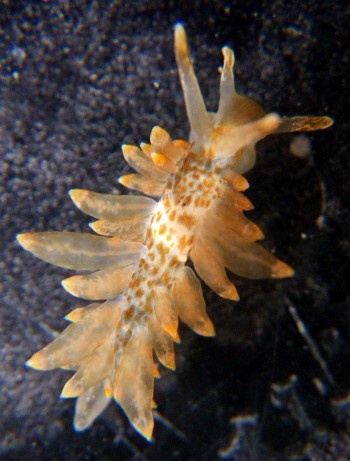
Dear Thorsten,
This is indeed a species of Eubranchus, but it is Eubranchus farrani rather than E. exiguus. E. farrani has a number of colour variations, but it is the only European species with the this colour pattern - orange tipped cerata and orange patches covering the dorsal part of the body.
Best wishes,
Bill Rudman
Re: Eubranchus farrani from the Mediterranean sea?
May 11, 2009
From: Dominique Horst
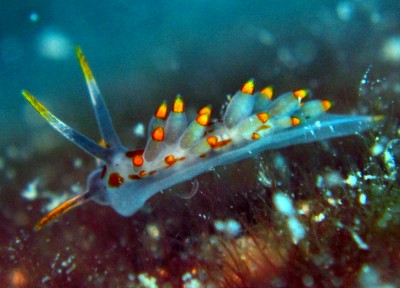
Concerning message #19975:
Hi Bill,
I guess this is Eubranchus farrani. For the id, I supposed the main characteristic for this species is the form of the cerata ?
Because colour variations of this animal make the identification not easy ...
I should say this one is "classical" as compared the specimen from Sylvie.
Locality: Antibes Cape, 11 m, France, Mediterranean sea, 25 April 2009. Length: 5 mm
Kind regards,
Dominique
dominique.horst@wanadoo.fr
Horst, D., 2009 (May 11) Re: Eubranchus farrani from the Mediterranean sea?. [Message in] Sea Slug Forum. Australian Museum, Sydney. Available from http://www.seaslugforum.net/find/22435Dear Dom,
Some of these species with considerable colour variation are difficult to define - at least by using their colour pattern. In this case,the inflated cerata are fairly characteristic, and so is the presence of the orange subterminal bands - but that doesn't help with some of the colour variations we have on the Forum where the orange band is absent. I guess some species are not easy to define, and to identify them often requires a good local knowledge.
The aeolids are often quite difficult to identify externally not only at the species level but at higher levels as well. Often we need to study the internal anatomy before we can be sure. That means that identifying species only from living animals and photos requires a good memory, a lot of books or/and access to a local expert.
Best wishes,
Bill Rudman
White Eubranchus farrani? from western Scotland
October 8, 2007
From: Jim Anderson
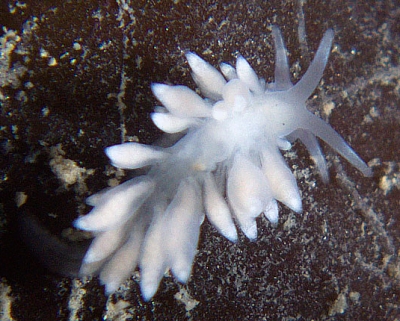
I was diving in the north west last weekend and was on the lookout for Eubranchus farrani following the recent discussions. I have seen them in this area at this time of the year in the past. Several 'yellow' and what I see as 'typical' mottled yellow , buff and white were seen but it took me to my last dive to find a 'white' version. Given the size of these animals in situ and my eyesight I could well be wrong with this one and hope that the forum can help with confirmation.
Locality: Bogha Ruadh , 8 m , Island of Muck, Scotland, NE Atlantic, 30 September, 2007, kelp blade on rocky reef. Length: 8 mm. Photographer: Jim Anderson.
Jim Anderson
jander4454@gmail.com
Anderson, J, 2007 (Oct 8) White Eubranchus farrani? from western Scotland. [Message in] Sea Slug Forum. Australian Museum, Sydney. Available from http://www.seaslugforum.net/find/20883Dear Jim,
Thanks for the photo. I think the very similar E. linenesis is characterised by the reddish spots on its back but it will be intersting to hear the views of Atlantic experts.
Best wishes,
Bill Rudman
Eubranchus farrani from Sardinia
July 10, 2007
From: Mauro Doneddu

Dear Bill,
I am sending you a photo of two strange Eubranchus from Tavolara Island, Sardinia, Italy, that don't match with any of the Mediterranean species; the size is about 20 mm. I was thinking it could be a dark colour variation of Eubranchus vittatus (Alder & Hancock, 1842), but it is look different to any other E. vittatus I have seen; however, it is the closest match I've been able to make. Can you identify it?
Locality: Tavolara Island, North-East Sardinia, 4 metres, Italy, Mediterranean, upper photo: December 2006; lower photo: 05 july 2007. Length: 20 mm
Many thanks in advance
Kind regards,
Mauro
doneddumauro@tiscali.it
Doneddu, M., 2007 (Jul 10) Eubranchus farrani from Sardinia. [Message in] Sea Slug Forum. Australian Museum, Sydney. Available from http://www.seaslugforum.net/find/20174
Dear Mauro,
This is a nice confirmation of an identification I made last week. I identified a species as a dark form of Eubranchus farrani but I had a few doubts because I couldn't see the orange patches on the body very clearly [See Sylvie Grall's message #19975]. However your photo alongside shows the colour pattern very clearly.
Best wishes,
Bill Rudman
Eubranchus farrani from the Mediterranean sea?
July 4, 2007
From: Sylvie Grall

Dear Bill,
I found this seaslug in very shallow water on Zostera noltii in the Etang de Thau close to Sète. This is a first and unique sighting (no other specimen on the same dive and I'ven't seen it again since then). I didn't see any hydroids close by.
Locality: Etang de Thau, 2 m, France, Saltwater lake, 14 April 2007, Seagrass (Zostera noltii) on mud. Length: under 3 cm. Photographer: Sylvie Grall.
Could you or anyone help me identify it?
Thank you very much.
Sylvie.
sylvgrall@aol.com
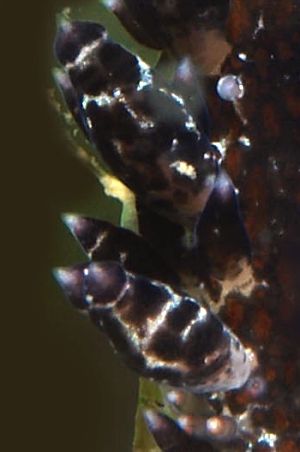

Dear Sylvie,
I am not an expert on the Mediterranean fauna but I am pretty sure this is a dark form of Eubranchus farrani. The shape of the cerata and whitish network on the cerata match other photos and in the close-up [lower left] I can see orange patches on the back, which is characteristic of the species.
Best wishes,
Bill Rudman
Eubranchus farrani from Scotland
June 21, 2007
From: Jim Anderson

Dear Bill,
Found during a dive on 28 May this year at Priest Rocks, Lochinver on the west coast of Scotland. There were lots of these animals on hydroids (Obelia sp.?) from 18 m to 12 m, water temperature 10 deg C. The trio are part of a group of approx 24 animals with spawn on a single rock approx 600 mm dia on sand, and the single on the main reef nearby. There were several of these with their cerata 'spread' flat and although my eyesight is not sharp enough to distinguish, I wondered if they might have been feeding. I estimate the big ones were a minimum 25 mm long. All seen during the dive appeared to be of the same colour scheme.
Regards,
Jim Anderson
Scottish Nudibranchs
jander4454@gmail.com



Dear Jim,
Thanks for this series of photos. It's interesting how some species of Eubranchus increase the size of their digestive gland by having short branches off the main duxt. These can be clearly seen in these animals.
Best wishes,
Bill Rudman
Re: Eubranchus farrani from Plymouth, UK
August 10, 2006
From: Judith Oakley

Bill,
I found just one specimen of Eubranchus farrani on Laminaria saccharina attached to marina pontoon. Egg whorls were nearby.
Locality: Mayflower Marina, Plymouth, UK, 07 August 2006, marina pontoon on Laminaria saccharina. Length: 1 cm. Photographer: Judith Oakley.
Best wishes
Judith
jomoakley@btinternet.com
Oakley, J.A., 2006 (Aug 10) Re: Eubranchus farrani from Plymouth, UK. [Message in] Sea Slug Forum. Australian Museum, Sydney. Available from http://www.seaslugforum.net/find/17386Dear Judith,
Thanks for this. It's nice to have it to compare with the dark brown animal in your recent message from the same spot [#17345 ].
Best wishes,
Bill Rudman
Eubranchus farrani from Plymouth, UK
August 8, 2006
From: Judith Oakley

Hi Bill,
Attaching 2 photos of possible colour morph of Eubranchus farrani from marina in Plymouth. Could you confirm identification.
Locality: Mayflower marina, Plymouth, UK, 03 August 2006, On Laminaria saccharina with hydroids on marina pontoon. Length: 1 cm. Photographer: Judith Oakley.
Thank you
Judith
jomoakley@btinternet.com
Oakley, J.A., 2006 (Aug 8) Eubranchus farrani from Plymouth, UK. [Message in] Sea Slug Forum. Australian Museum, Sydney. Available from http://www.seaslugforum.net/find/17345
Dear Judith,
Yes I would agree that this is a dark form of E. farrani
Best wishes,
Bill Rudman
Re: Colour morphs of Eubranchus farrani from UK?
August 8, 2005
From: Jim Anderson
Re message #14483:
They all look pretty similar to examples I've seen -http://www.scottishnudibranchs.co.uk/html/eubranchus-farrani.html
Shows the thumbnails.
Jim Anderson
jander4454@gmail.com
Anderson, J.B., 2005 (Aug 8) Re: Colour morphs of Eubranchus farrani from UK?. [Message in] Sea Slug Forum. Australian Museum, Sydney. Available from http://www.seaslugforum.net/find/14501Thanks Jim,
Bill Rudman
Colour morphs of Eubranchus farrani from UK?
August 5, 2005
From: Judith Oakley

Please can you confirm whether these are all variations of Eubranchus farrani? They were found on marina pontoons in South Devon. Thanks
Locality: Queen Anne's Battery Marina, Plymouth. Devon, UK. Length: 7 mm. 02 August 2005. on marina pontoons. Photographer: Judith Oakley
Judith Oakley
kf1@mba.ac.uk
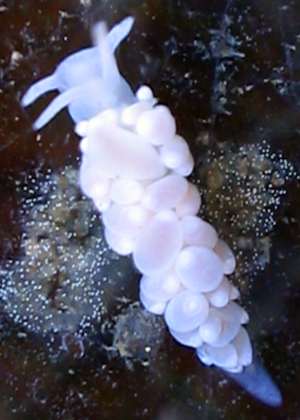
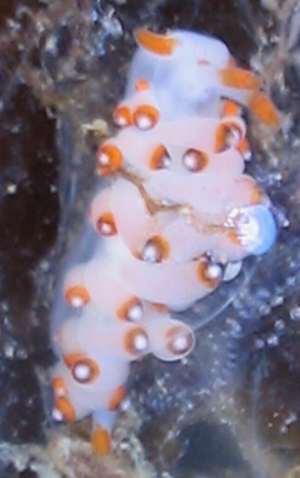
Dear Judith,
From the other side of the world I am a little hesitant to say anything too definitive on this problematic group of animals, but I would tend to agree that they are colour morphs of E. farrani - but hopefully we can get confirmation from a local expert.
Best wishes,
Bill Rudman
Eubranchus farrani from the Mediterranean
April 18, 2005
From: Sylvie Grall
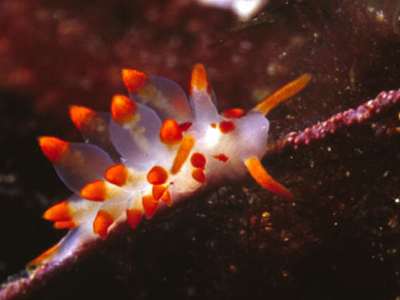
Dear Bill,
It is a good year for sea slugs in the Med! I enclose another species I haven't seen before. It was crawling on a feather hydroid, with eggs in loose ribbon close by.
Can you help?
Thank you.
Sylvie.
Locality: Les Lecques, France. Mediterranean. Depth: 18 m. Length: 10 mm. 26 March 2005. on flat rock with Halimeda and hydroids. Photographer: Sylvie Grall
Sylvie Grall
sgrall@compuserve.com
Grall, S., 2005 (Apr 18) Eubranchus farrani from the Mediterranean. [Message in] Sea Slug Forum. Australian Museum, Sydney. Available from http://www.seaslugforum.net/find/13501Dear Sylvie,
This is a spectacular colour form of Eubranchus farrani.
Best wishes,
Bill Rudman
Eubranchus farrani from Adriatic Sea
April 14, 2005
From: Egidio Trainito
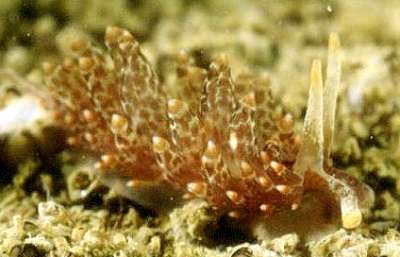
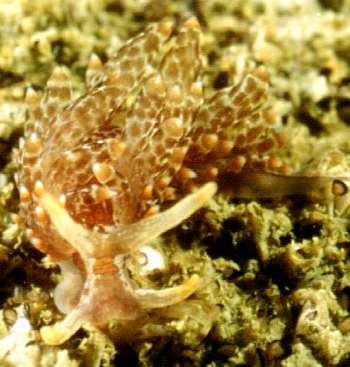
May I have your opinion on the attached nudibranch?
Locality: Ancona, Italy, Adriatic Sea. Depth: unknown. Photographer: Marco Giuliano.
Egidio Trainito
et@egidiotrainito.it
Trainito, E., 2005 (Apr 14) Eubranchus farrani from Adriatic Sea. [Message in] Sea Slug Forum. Australian Museum, Sydney. Available from http://www.seaslugforum.net/find/13451Dear Egidio,
This is a colour form of Eubranchus farrani. Your animal is almost identical to one illustrated by Schmekel & Portmann (1982: Pl.14, figs 1-3) from Naples.
-
Schmekel, L. & Portmann, A (1982) Opisthobranchia des Mittelmeeres, Nudibranchia und Saccoglossa. Fauna e Flora del Golfo Napoli, 40: 1-410. Springer-Verlag: Berlin
Best wishes,
Bill Rudman
Eubranchus farrani from Holland
December 15, 2003
From: Duncan v Vliet
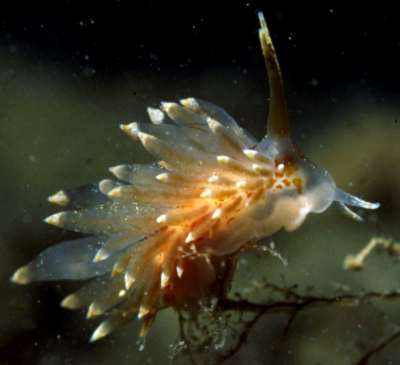
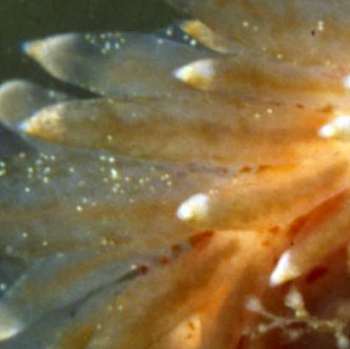
Dear Bill
Can jou tell me if this photo is of Eubranchus farrani.
The picture was taken in the Oosterschelde near Goes en Sas, Netherlands. at a depth of 6 meters 13 June 2003
Thanks
Duncan v Vliet
www.onderwaterwereld.net
duncan@onderwaterwereld.net
v Vliet , D., 2003 (Dec 15) Eubranchus farrani from Holland. [Message in] Sea Slug Forum. Australian Museum, Sydney. Available from http://www.seaslugforum.net/find/11695Dear Duncan
Yes I think this is E. farrani. A you'll see from the information already on the Forum for this species, it has a number of colour variations. The orange-brown marks on the body of your animal, and the traces of an orange subterminal band on the swollen cerata certainly fit this species.
Best wishes
Bill Rudman
Re: Eubranchus farrani
October 15, 2003
From: Jim Anderson

Dear Bill,
Concerning my message - I seem to have sent you a different illustration to that I intended albeit of another Eubranchus farrani seen on the dive. 27 September, 2003 at An Dubh Sgeir, Skye on the west coast, Scotland. At 18 metres, two examples close together on a kelp blade. Water temperature 14 deg C.
Attached is the image I intended to send.
Regards,
Jim Anderson
jander4454@blueyonder.co.uk
Anderson, J., 2003 (Oct 15) Re: Eubranchus farrani. [Message in] Sea Slug Forum. Australian Museum, Sydney. Available from http://www.seaslugforum.net/find/11240Thanks Jim,
I'm glad I am not the only one who has the odd brainstorm. This photo nicely shows two of the four colour morphs Bernard Picton mentions in his book. He mentions that genetic studies can find no differences
Best wishes
Bill Rudman
Eubranchus farrani from Scotland
October 14, 2003
From: Jim Anderson

Dear Bill,
The attached Eubranchus farrani were seen on 27 September, 2003 at An Dubh Sgeir, Skye on the west coast, Scotland. At 18 metres, two examples close together on a kelp blade. Water temperature 14 deg C.
Jim Anderson
jander4454@blueyonder.co.uk
Anderson, J., 2003 (Oct 14) Eubranchus farrani from Scotland. [Message in] Sea Slug Forum. Australian Museum, Sydney. Available from http://www.seaslugforum.net/find/11207Thanks Jim,
Nice to see an orange form of this species
Best wishes
Bill Rudman
Re: Catriona gymnota? from Italy
August 12, 2003
From: Juan Lucas Cervera
Dear Bill,
Concerning the Catriona gymnota? from Italy. I agree with you. It's Eubranchus farrani.
Lucas.
lucas.cervera@uca.es
Cervera, J.L., 2003 (Aug 12) Re: Catriona gymnota? from Italy. [Message in] Sea Slug Forum. Australian Museum, Sydney. Available from http://www.seaslugforum.net/find/10718Thanks Lucas,
Bill Rudman
Catriona gymnota? from Italy
August 8, 2003
From: Gennaro Ciavarella
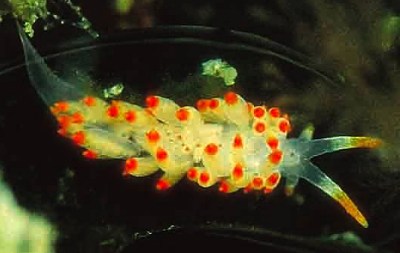
Is this a Catriona gymnota? I took this photo at Isole Tremiti in the middle Adriatic Sea last may.
Gennaro Ciavarella
gciavarella@tin.it
Ciavarella, G., 2003 (Aug 8) Catriona gymnota? from Italy. [Message in] Sea Slug Forum. Australian Museum, Sydney. Available from http://www.seaslugforum.net/find/10261Dear Gennaro,
I don't think this is Cuthona gymnota which is much dukller in colour and I don't think has an orange-tipped form. One possibility is that it is Eubranchus farrani but I ma not sure if there is a colour form which lacks orange markings on the back as yours does. Hopefully someone with local knowledge can help us
Best wishes,
Bill Rudman
Eubranchus farrani from Spain & France
August 1, 2003
From: Jean-Pierre Bielecki

Hi Bill
Here are some shots of 3 specimens of Eubranchus farrani.
The lower left one on the hydroid was found in Spain (Puerto de la Selva) in September 1999. Depth: 15m, size: 5mm.
The others was found in France (Sete, étang de Thau) in March 2000, depth: 5m, size: 1cm.
Best wishes
Jean-Pierre
bielecki.jeanpierre@free.fr


Thanks Jean-Pierre,
It's good to get some photos of the 'typical' colour form
Bill Rudman
Re: unidentified Scottish nudibranchs (2)
September 17, 1999
From: Bernard Picton
Just had a look at Jim Anderson's unidentified aeolids and I'm sure that the top photo is Eubranchus farrani. It has several quite distinct colour morphs, but often found together and indistiguishable by protein electrophoresis.
Bernard Picton
bernard.picton.um@nics.gov.uk
Picton, B., 1999 (Sep 17) Re: unidentified Scottish nudibranchs (2). [Message in] Sea Slug Forum. Australian Museum, Sydney. Available from http://www.seaslugforum.net/find/1344Thanks Bernard,
I've split your message in two. I have put the other half on a page for Flabellina browni. Although I'm relaxed about unidentified species from the Indo-west Pacific, I was feeling a little uncomfortable about two unknown aeolids from Britain.
Best wishes,
Bill Rudman.
